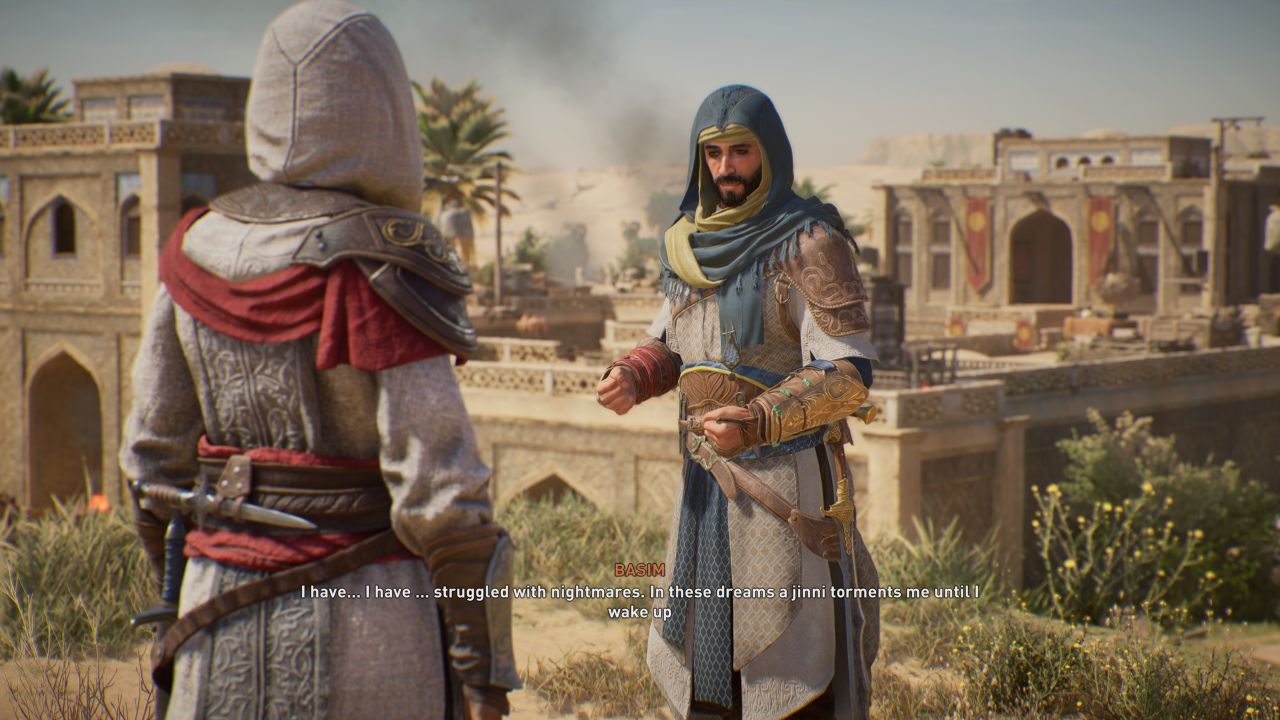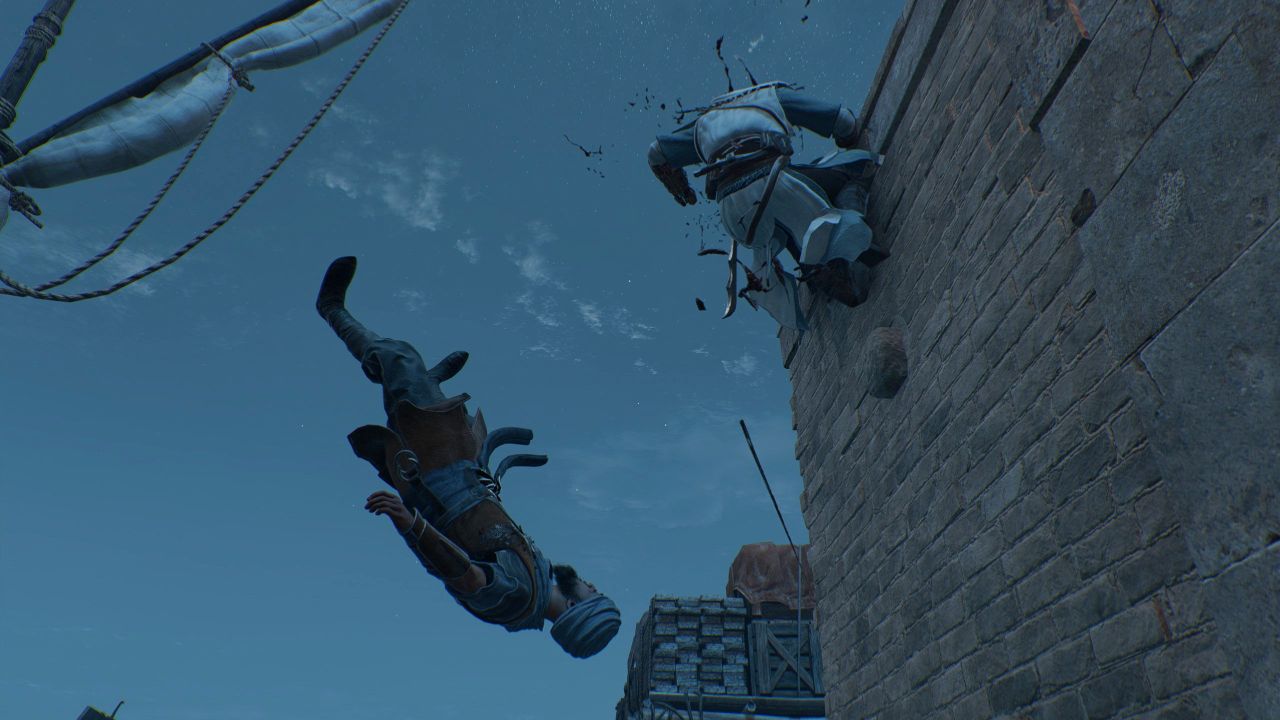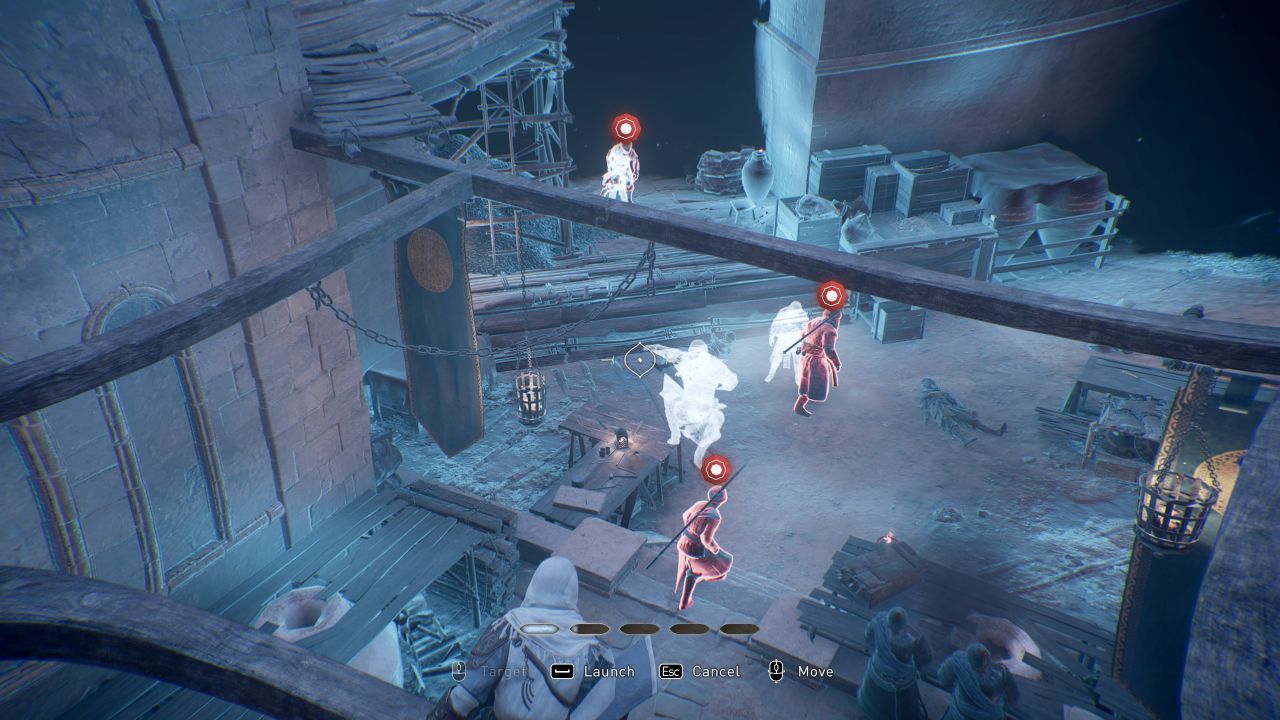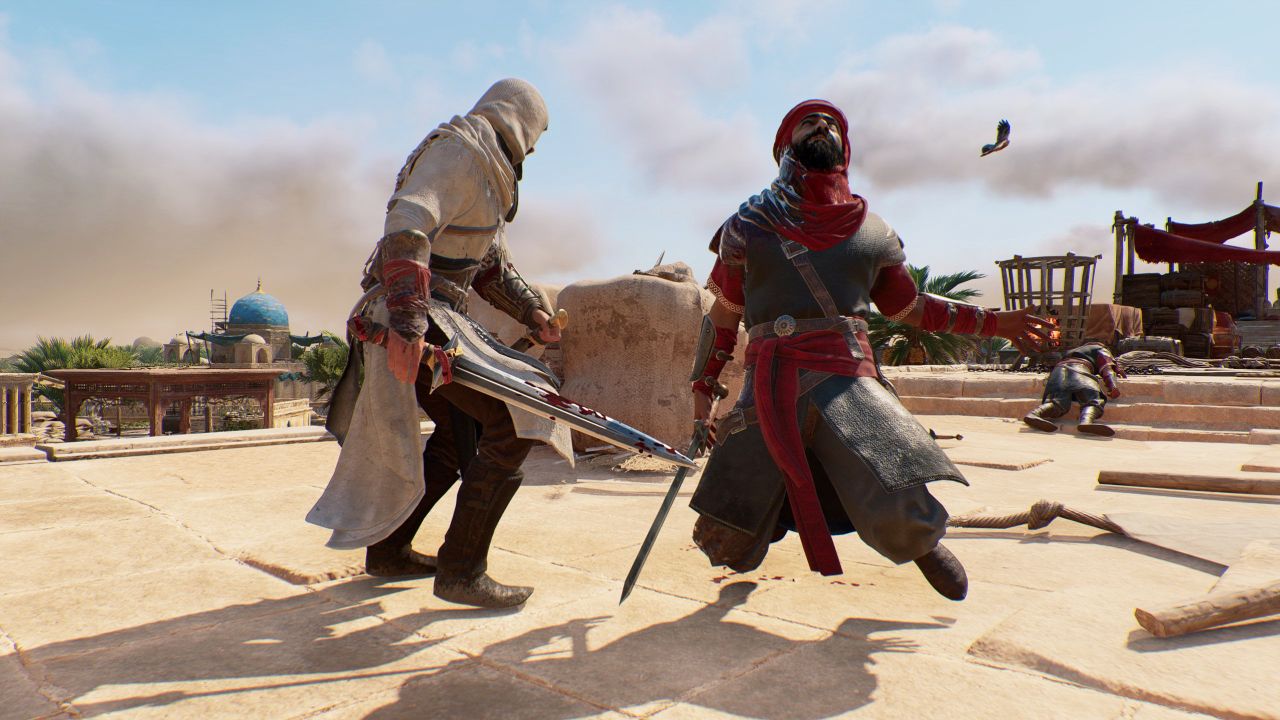Assassin's Creed Mirage Review
An ancient creed returned on short order
Did Ubisoft let the genie out of the bottle with Assassin's Creed Origins? Some argue that the franchise only got bigger and better after adopting a more open-world RPG style, while others claim that it became bloated and lost its identity. The latest entry, Assassin's Creed Mirage, should be right up the dusty alley of those who prefer the earlier titles. Mirage aims to rediscover the series' roots, with a focus on stealth and parkour movement in a smaller world. Originally conceived as an expansion for Valhalla, it grew big enough to become a standalone release. While Mirage is somewhat inconsistent and carries over flaws from the recent games, it is still mostly a valuable return to the classic experience.

Set in Baghdad during the 9th century, Mirage follows Basim Ibn Ishaq, a street thief who crosses paths with the Hidden Ones, the precursors to the Assassins. After a heist goes wrong, Basim flees with a senior member to their secret base in a canyon near Alamut. Here he learns how to be a stealthy assassin, in a decent tutorial, and eventually becomes a full member after cutting off a finger to fit a new hidden blade. When the Hidden Ones learn that an evil clandestine faction, the Order of the Ancients, is causing trouble in Baghdad, Basim and others are dispatched to investigate and eliminate key members before they can take control of the city and change history.
Mirage’s narrative is unexciting and basic. Basim is a bland protagonist, despite being deemed worthy of his own adventure after being a side character in Valhalla. His brief nightmares about a monstrous jinni are the only time he comes close to being interesting. He usually obeys orders and kills major targets by himself, despite only being recently promoted. Although he has no family, he does intermittently see an old friend, Nehal, from his thieving days. Nehal’s role in the story is predictable and disappointing. After the twenty-hour campaign wraps, it is hard to shake the feeling that Mirage deserved a far better protagonist.
Senior members of the Hidden Ones also lack appeal; many are stoic and emotionless talking heads that we learn little about. Roshan is the most important, being the mentor of Basim and heavily involved with major quests, and she has the iconic gravelly voice of Shohreh Aghdashloo, but sadly her tale is vapid and ends poorly too. The one advantage Mirage has over previous games in the series is that there is no modern-day story component and it is not missed while exploring the streets of ancient Baghdad.

Baghdad is a good size and one of the best main cities the series has created in some time. The “round city” is made up of concentric urban areas, separated by fortified walls, sprinkled with palaces, mud-brick structures, and markets, with many rivers that cut it into slices. The central region is home to the privileged, with lush gardens and high walls. Many buildings in Baghdad are multiple stories high, placed in close proximity to create narrow alleyways and hidden courtyards. Surrounding the city is a desert, with the occasional farm, oasis, and settlement. Viewpoints are scattered about, allowing fast-travel and highlighting points of interest when synchronized. Players can ride camels and horses, but these only travel at a tolerable speed outside the city limits. The biggest criticism of Baghdad is that it is quite homogenized, especially with its palaces, and only after exploring do the smaller details stand out.
Baghdad is built to facilitate the free-running parkour that has been absent in the franchise for awhile. Given the closeness of buildings, remaining on rooftops while you cross the city is not only possible but can be the quickest way to travel. Boxes, ladders, ramps, building protrusions, and more allow players to quickly ascend. Rope bridges, poles, balconies, and canopies let Basim cross streets while preserving elevation. While the city is ideal to run across, the game’s movement mechanics can be a little frustrating. Getting through an open window can be a nightmare, resulting in players falling onto a hostile guard’s head. Occasionally Basim gets stuck too, unable to scale waist-high walls until he shimmies back. The parkour movement is generally too sticky, making it difficult to precisely control Basim's movements. While players will adapt to the navigation quirks, it is a little disappointing that free-running is not always in tune with a city that seems so well designed for it.
The Hidden Ones have Basim running all across the city to complete story quests at each of their underground bureaus. Most of the main quests fall into two broad categories: investigations and executions. During the investigations, Basim will collect evidence and talk to side characters for info, or undertake mini-quests in quid-pro-quo scenarios. All of the intel is collated in the game’s investigation menu, for quick reference. Often investigation stages encourage stealth, which means avoiding (or killing) guards around the specific area while hunting clues. While investigations can be simple, some are clumsy. In the Grand Bazaar, players merely stumble into clues serendipitously. And in other missions, finding intel is more like a pixel hunt.

Actually eliminating members of The Order is typically more satisfying. Because of succinct pre-mission cutscenes and the investigation process, the game provides good context for each target. It is a little annoying that most have to be lured out into the open, but understandable given how easy it is to kill with a throwing knife or hidden blade. Mission specific distractions can make them leave their hidey holes, a few disguises can get Basim up close and personal, and sometimes it might be just a case of stealing a key from a nearby guard. Unfortunately, the way to access targets often feels synthetic. It would be nice to have far more natural options for every major assassination, since there are not that many, but at least each one feels different. When a main target is finally killed, players are treated to a brief conversation with the victim. Similar to those final chats that Ezio performed in his stellar trilogy, these last words may be short but are still the highlight of the narrative.
Outside the main story, there are side activities to undertake, although most involve hunting for collectibles, which can be tedious and unrewarding. Gear chests can be opened, once you find a way into a sealed building by flinging knives at locks through barred windows. Special artifacts can be pickpocketed from brainless targets. Sites can be visited to learn historically accurate facts about Baghdad. Enigmas are almost worth collecting, as they’re vague treasure maps (or notes) that test knowledge of the city. Rewards are rarely enticing, with outfit dyes, weapon upgrades, and cosmetic talismans forming the bulk. Contracts are the only decent form of side content. These are just small quests that seem procedurally generated, until they eventually run out. They require players to assassinate, escort, rescue, or investigate all across the city. There are even a few tailing missions and these are not bad if you either climb to the rooftops or maintain perfect stealth at street level.
Stealth plays a major role in Mirage, as there are only a handful of encounters where Basim is forced to draw swords. It is refreshing to actually spend most of the game hidden. Both eagle vision and Basim’s trusty airborne eagle can spot enemies and mission objectives. While sneaking is similar to how it functioned in Odyssey, which means it is mostly decent, the sheer volume exposes issues. It is possible to continually lure individual guards by whistling, even from big groups. If a guard sees Basim kill-and-drag their buddy around a corner, they usually won’t enter full attack mode, even on the hardest difficulty. They sometimes ignore dead bodies and get stuck. Even their searches tend to be cursory. Eliminating foes quickly and hiding bodies gives them no chance to act dumb. So stealth is fine when the AI guards are oblivious to the rising body count, letting Basim perform silent ledge takedowns and air assassinations to his heart’s content.

A new Assassin’s Focus ability is a way for players to eliminate up to five guards simultaneously. It’s a bit like the Mark and Execute feature in Splinter Cell: Conviction, and it is recharged by performing stealth kills. It has a short range and can only be used when undetected. Launching a Focus attack rapidly teleports Basim to each target for a quick stab, until they are all dead. Although unrealistic, it can be satisfying to deploy when fully upgraded and is completely optional. It also encourages stealth kills, just to top up the meter for a powerful finish.
Tools and gear make Basim even more deadly while undercover. Throwing knives are incredibly powerful and can be extracted from dead bodies when upgraded. The blowdart can put multiple targets to sleep, for a follow-up assassination or easy pickpocket. Even the smoke bomb can blind and make guards forget what just happened. All tools have multiple upgrade paths that might increase range or ammunition, and some suit a more aggressive play style.

Direct combat is messy at first, possibly because it is infrequent. It does become enjoyable enough once you learn the basics. Players only need to dodge, parry, maintain stamina, and reposition to attack the back of armored targets. Time the parry well and there is usually an instant-kill option. Players can equip different swords, outfits, and daggers that provide perks, like dealing poison damage, but the starting gear can be used for the whole game. On the hardest difficulty, different enemies attack in quick succession and parries do not always grant a retaliation kill. If the battle looks lost, a health potion can be swallowed to remain in the fight. And, any of the aforementioned tools can be pulled out and deployed, turning a fight into a sleeping contest. Fighting or murdering (around witnesses) will raise notoriety, which leads to civilians calling for guards and extra patrols on rooftops. To make the city forget such transgressions, posters can be torn down and public speakers can be bribed, which is a nice homage to Assassin’s Creed II. Overall, the mostly optional sword combat is adequate but plays second fiddle to stealth.
One of the most impressive things about Mirage is just how well it runs compared to a lot of other games this year. At maximum settings, it pumps out high framerates without a stutter. It also looks pretty great when it comes to panoramic views of the city or desert areas. Its crisp visuals compare closely to those from Origins, due to the similar vibrant art style, buildings, and geographical location. Unfortunately it lets itself down when it comes to interiors and characters. Faces and their animations look dated, even for the main cast. The lighting for some interiors can be ugly, with rooms that look like they’re covered in glowing plastic. The engine just seems better suited to big outdoor spaces, which is ironic for Mirage given its desire to pare down.

Assassin’s Creed Mirage is a mixed bag, but perhaps that’s to be expected for a franchise that has decided to reset itself after a few gargantuan entries. Fans of the early games will likely find it enjoyable, and those tired of big open worlds will appreciate the more digestible 20-hour campaign. The focus on stealth is welcome, though its execution is not flawless. The city of Baghdad is a brilliant setting to parkour through, even if you may get stuck occasionally. Assassination missions are generally the highlight, though the investigation stages can be clumsy. It remains to be seen whether Ubisoft will continue to go big or focus on these smaller experiences, but it would be a shame if Mirage was the only attempt to put the genie back in the bottle.
 Comments
Comments



















